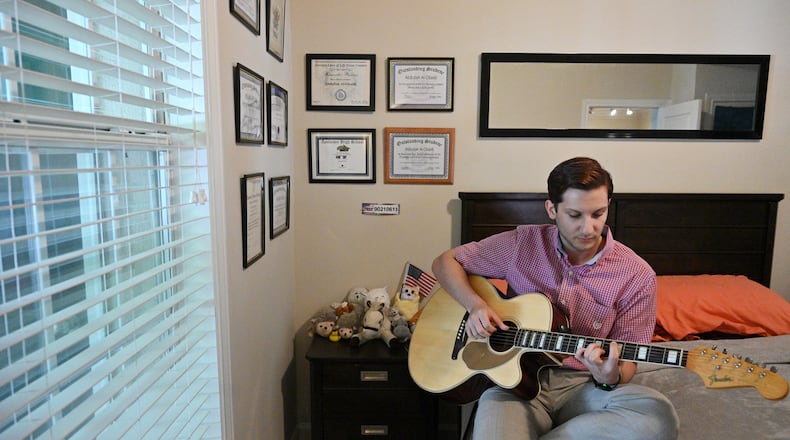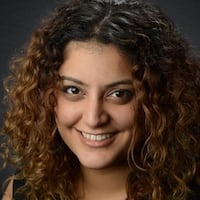Abdallah Al-Obaidi knows what it’s like to be an outsider.
The 23-year-old has lived life as a refugee and had moments when he felt voiceless in a new country. Now, he wants to use his words to lift up others
“As a future doctor I am going to provide medical care for those undocumented or uninsured, like I was uninsured at some point in my life,” Al-Obaidi, 23, said. “Life comes full circle and now that I have my voice, this is the time when I have to speak as loud as I can and be as vocal as I can with my advocacy.”
Credit: HYOSUB SHIN / AJC
Credit: HYOSUB SHIN / AJC
Al-Obaidi’s journey to find his voice has been documented by the group USA for UNHCR, a national partner for the United Nations High Commissioner for Refugees. The nonprofit made an animation based on Al-Obaidi’s life as a part of their Refugee Youth Storyteller’s Celebration.
The roughly two-minute movie was released just in time for World Refugee Day on Sunday — a day designated by the United Nations to honor the 26 million refugees currently living across the world.
“At the end of the day my goal is always to push out anything that is going to help people connect with the issue of refugees,” said Nicholas Feeney, communications manager for USA for UNHCR. “Not only to build empathy but also to showcase that these people live in your community. You don’t know the backstory of anybody you meet on the street.”
The Trump administration lowered the number of refugees permitted in the United States to 15,000 this fiscal year — a major dip from the historic annual average cap of 95,000. President Joe Biden, after some wavering, raised the nation’s cap on refugee admissions to 62,500, but is unlikely to meet that goal by September 30, when the current fiscal year ends.
“We went from welcoming roughly 3,000 refugees into Georgia year by year, to last year only welcoming 500. And that has an impact,” said Justin Howell, the Atlanta executive director for the International Rescue Committee. “These are human beings with the same aspirations, the same hopes, and the same dreams a lot of us share.”
On World Refugee Day the attention shifts towards the people like Al-Obaidi and their journeys.
Al-Obaidi not only narrates the animation based on his life, which is titled “Finding my voice: Abdallah’s journey from refugee to medical student,” he also plays some of the music used in the background.
The animation begins with the words, “Everything changed when my school in Baghdad was bombed. I was in first grade,” and from there takes the viewer on a journey through Al-Obaidi’s life.
The family fled Baghdad in 2005, believing the bomb could have been retaliation for his father informing U.S. military forces about a torture facility. The family fled to Amman, Jordan. During his early years there, Al-Obaidi didn’t have many friends at school and became more introverted.
But those feelings changed thanks to an episode of the Disney Channel television series “Hannah Montana.”
“It was Billy Ray Cyrus playing the guitar, I looked at my mom and said ‘mom, I want to be able to do that,’” Al-Obaidi said. “I felt because I couldn’t communicate with people music became my mode of communication.”
During the eight years he was in Jordan, music is what helped Al-Obaidi find his voice. The day he found out his family was being resettled in the United States he’d just won a school talent show performing the Ed Sheeran song “Small Bump.”
He was just starting to feel like he belonged.
“I was happy at first then it hit me,” he said. “Now that I won the talent show, and I have friends, I have to start all over. It was kind of bittersweet.”
His family had two weeks to pack their belongings before heading for Georgia.
Since he knew limited English, and his credits hadn’t transferred, Al-Obaidi was told he wasn’t going to be permitted to advance into the 10th grade. He wasn’t going to let that to happen.
Al-Obaidi attended classes and studied to pass exams that would allow him to move up to the next grade level. He kept an Arabic to English dictionary close by as he read.
“The more I read, the more I learned and that is how I caught up with my English,” he said. “It took me four to five weeks to study and take all the exams in succession. And I wasn’t expecting to pass. And I was one question off from failing, I was riding the line.”
Since then, Al-Obaidi has become a U.S. citizen, graduated from Emory University with a degree in chemistry, and become a medical translator. He currently works as an EMT and soon he’ll attend Tufts University for medical school.
“I think the most important thing I keep telling Abdallah is, your work is just about to start,” said Dr. Heval Mohamed Kelli, a cardiologist at Northside Hospital, who is also Al-Obaidi’s mentor.
When they first met, Kelli, who happens to be a refugee from Syria, told Al-Obaidi that he’d mentor him under one condition: he’d have to pay it forward.
“They gotta go back and do the same thing,” Kelli said. “You have to teach people to invest in the community.”
And Al-Obaidi plans to do just that.
“I’ve made a vow to myself that I’m going to keep it going,” he said. “I got here because someone invested in me and it wouldn’t be like me to not keep moving it forward. In a way by going into medicine, I’m giving back what I needed as a kid: security, mentorship, guidance and reassurance.”
Paradise Afshar is a Report for America corps member covering immigrant communities.
About the Author
Keep Reading
The Latest
Featured





